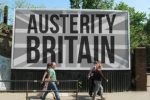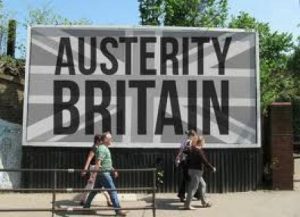Is Austerity Over?

“When the Church hears the cry of the oppressed it cannot but denounce the social structures that give rise to and perpetuate the misery from which the cry arises” Bl. Oscar Romero
In “Reimagining Britain” Archbishop Justin Welby writes austerity is “a word that almost invariably conceals the crushing of the weak”. Since 2010 when the austerity programme was introduced by Chancellor George Osborne, it has been the ‘welfare budget’ that has borne  the brunt of the reductions. It is the unemployed, those on disability and the working poor in low paid temporary and part time or zero hours work or who have registered themselves as ‘self-employed’ who are paying the price, not least as any wage increases are still wiped out by inflation and rising prices. Over a million now turn up at food banks as working families struggle to make ends meet.
the brunt of the reductions. It is the unemployed, those on disability and the working poor in low paid temporary and part time or zero hours work or who have registered themselves as ‘self-employed’ who are paying the price, not least as any wage increases are still wiped out by inflation and rising prices. Over a million now turn up at food banks as working families struggle to make ends meet.
What’s more, the Chancellor’s talk of a ‘light at the end of the tunnel’ for thousands of families is ‘the light of the on coming train’ of more reductions in income to come. In April this year the second largest annual cut to the benefits budget kicks in. According to the independent Resolution Foundation over 11 million people will pay the price for £2.5 billion being taken out of the welfare budget. The welcomed increase in the national living wage (the traditional statutory minimum wage) will be wiped out by these cuts leaving people worse off. From April only the first two children will qualify for child benefit support. In 2012 child benefit was removed from higher earners. This year the limiting of child benefit to the first two children will mean that 150,00 families lose £2,870 a year for having a third child. It was a strange cut introduced by Iain Duncan Smith that reeked of the Chinese ‘family reduction policies’ as the only non-means tested benefit given directly to the mother as society’s contribution to bringing up the next generation. It is in reality an anti-family policy which he insisted was to make parents be financially responsible for having children. Limiting free school meals for children in year three under the new universal credit rules only compounds the impact.
Yet the Catholic Church approach has always resisted basing family policy on personal economic situations. Refusing to pay for the third born (especially if they are a twin) undermines that family centred approach and makes families subject to economics. The poor pay a high price for having children. Meanwhile working age ‘top up’ benefits will be frozen for a third year, affecting some 11 million working families in lower paid work. Many will be moved onto the new universal credit and thousands will lose the family element of support from new tax credits. 400, 000 families will lose out and be expected to
search for higher paid work to make up for their losses. According to the Institute of Fiscal Studies Britain is ‘nowhere near out of austerity’. For thousands of families in low paid work the worst is still to come with real reductions in their incomes. Meanwhile the highest earners are benefiting from real tax cuts. Pope Francis’s invocation to become a Church of the poor has yet to be realized here.
“The Church is persecuted because it wants to be the Church of Christ. If the church preaches eternal salvation without getting involved in the real problems of the world it may be respected and appreciated and even rewarded with privileges; but if its mission is to denounce sins that force people into poverty and if it proclaims the hope of a more just and humane world then it will suffer persecution and calumny and be called subversive and communist” Bl. Oscar Romero
*****************************************
